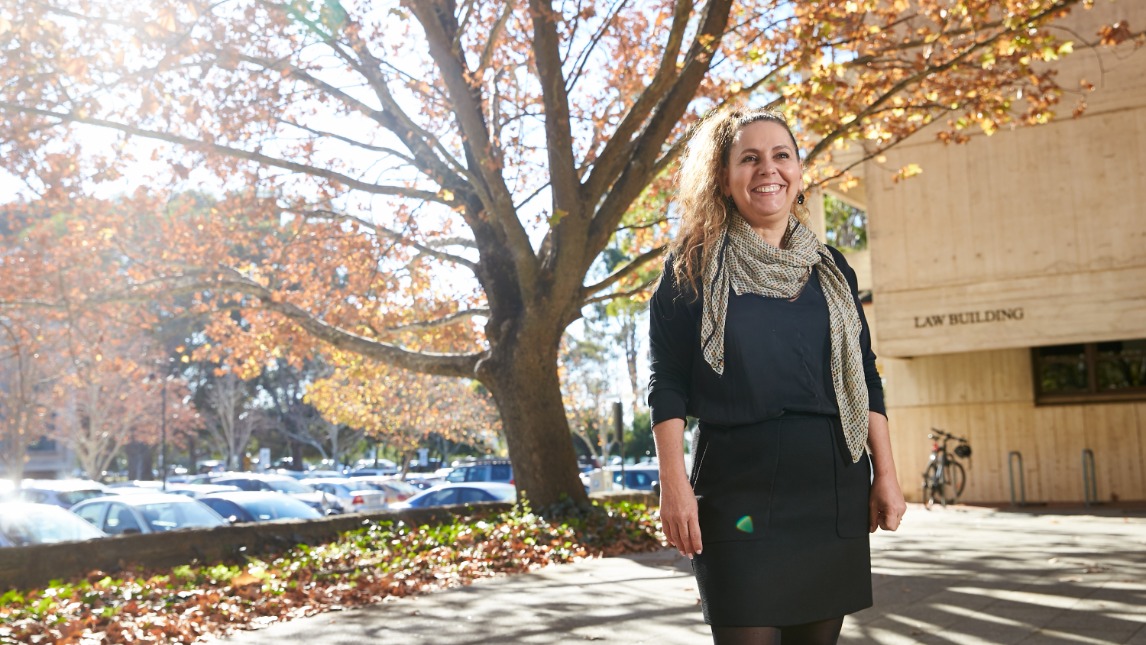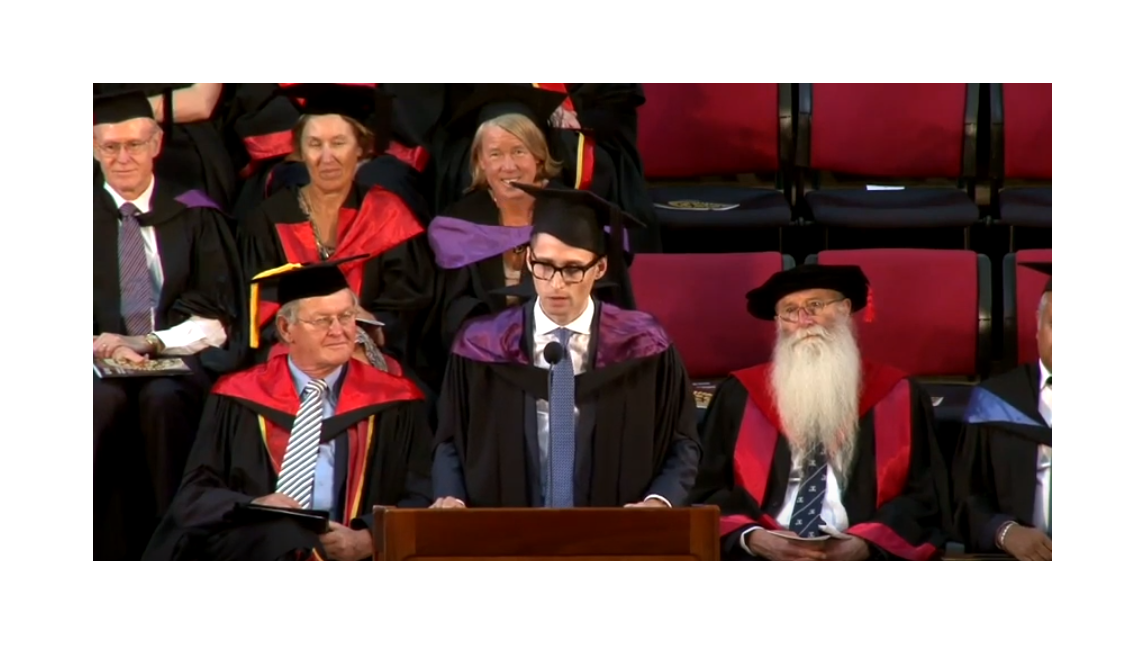Obiter Dicta
June 2019
News
Vale Bob Hawke
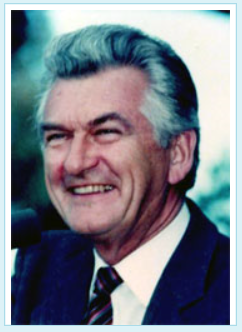
With the death of Bob Hawke (the Hon Robert James Lee Hawke AC GCL), Australia has lost one of its longest-serving and most successful Prime Ministers, and the Law School one of its most distinguished graduates. As Prime Minister between 1983 and 1991, Hawke was responsible for important social and economic reforms, for example creating Medicare, introducing the Family Assistance Scheme, floating the dollar, deregulating the financial sector and entering into an arrangement with the ACTU regulating wage demands in return for keeping inflation under control. Environmentalists will remember him for halting the construction of the Franklin Dam in Tasmania; lawyers should not forget the part he played in the passing of the Australia Acts, which finally severed Australia’s legislative and judicial links with the UK. Before entering politics, Hawke rose to prominence with the ACTU, becoming responsible for wage arbitration and ultimately, in 1969, being elected its President. Ten years later he entered Parliament, and in 1983, in just a few short weeks, he took over from Bill Hayden as leader and then led the ALP to electoral victory. He was to win a further three elections in his nine years in office before finally being displaced by Paul Keating in 1991.
I was lucky enough to meet Bob in March of this year, in connection with my work on what will become a centenary history of the Law School. Though he was not very well, he kindly consented to see me at his Sydney home, and his wife Blanche made us very welcome. We talked on the terrace overlooking the river, where Bob spent much of his time in his last years.
Educated at Perth Modern School, Bob went on to study at the Law School between 1947 and 1950. He always retained happy memories of the Law School and the University, writing in his memoirs:
To be a student at the University of Western Australia in 1947 was an unlimited joy. … This sense of exhilaration was enhanced by the incomparable beauty of the university campus … . The campus throbbed with life. Social, political and religious clubs catered for all tastes, while the sporting environment and facilities were superb. In the immediate post-war period an additional dimension came from the presence at university of many ex-servicemen studying under the Commonwealth Reconstruction Training Scheme.
Bob was an extremely talented and ambitious student, vying with his great friend and contemporary John Toohey for the highest honours. In first year his marks were affected by a bad motorcycle accident which caused him to miss a good deal of study, but there was a marked improvement in second year, and in his third year (as he reminded me) he was awarded the John Norman Barker Prize for the best third year student. Nonetheless, because of his first year marks, he needed distinctions in every final year subject to finish with first class honours. He managed four out of five, but could not get an A in Equity, and so had to be content with second class honours. John Toohey finished ahead of him and was awarded a first. Much later, as Prime Minister, Bob had the pleasure of approving Toohey’s appointment to the High Court.
Hawke and Toohey were part of a small class of about 15 students – all male. Another member of the class that Bob remembered was Alan Barblett, later Chief Judge of the Family Court of Western Australia (and a member of the Australian hockey team at the Melbourne Olympics in 1956). In 1947 Professor Beasley was still the only full-time staff member. He taught Constitutional Law, a subject Bob picked out as the one that was the most use to him in later life. He remembered Beasley as rather left wing, a strong opponent of the move to ban the Communist Party (eventually struck down by the High Court). Beasley supported the Law Faculty’s sporting endeavours, and Bob remembered a booming voice shouting “Well played, Hawke” from the touchline during a rugby match. He was fully involved in all aspects of university life: he and Toohey were part of the Labor Club for a time, and by his last year in Law School Bob was becoming very involved in Guild affairs – possibly a reason, he thought, why he missed his first.
After graduating he stayed on to complete a BA, and became President of the Guild in 1952. Two facts reflect his many-sided contribution. In the late 1970s Briefs more than once reprinted the Law School Song, with six additional verses credited to Bob Hawke. One of the more printable verses reads “To get Bs, Bs, you’ve got to be in with ‘Beas’ … in the Faculty of Law”: clearly the Law School at this time was a very male place and alcohol played its part. At the same time, however, Hawke showed considerable concern for others. He helped to establish an International Club for visiting Asian students, because he thought they suffered from isolation on campus, and right to the end of his life a book signed by many of these students remained an important possession. It is no surprise that, as Prime Minister, after the Tiananmen Square massacre, Bob Hawke took the decision to allow Chinese students to stay in Australia.
In 1953 Bob was awarded a Rhodes Scholarship and proceeded to Oxford, where he completed a B Litt thesis on the Australian arbitration system which became a standard work of reference – and foreshadowed his later career with the ACTU. However, he also played a full part in the social and sporting life of Oxford (acquiring the nickname “Digger”) and it was in Oxford that he set a world record by downing a yard of ale (two and a half pints) in 11 seconds.
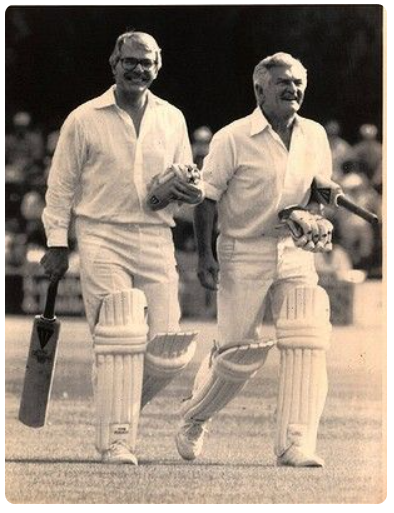
Bob was a pretty good cricketer, playing first grade for University and later for the ACT. At Oxford, he was good enough to be selected to go on the Oxford tour in 1954, at a time when the Oxford side contained two future England captains (Colin Cowdrey, who remained a friend for many years, and Mike Smith) and several others who later played Test or first-class cricket. I was keen to ask him about his cricket at Oxford, since I had known two of his Oxford team-mates who later played for Warwickshire. (In another life, before coming to Western Australia, I had spent several summers as scorer for various Warwickshire teams, and in some first-class and Test matches.) He had been a wicket-keeper, and he thought that if he had kept up his wicket-keeping he might perhaps have been selected instead of the chosen wicket-keeper; as it was, he was twelfth man for the match against Cambridge at Lord’s, and spent some time fielding as a substitute. One of the players I had known, Jimmy Allan (who later played for Scotland, Kent and Warwickshire) had been Bob’s companion when Bob’s van was stopped by the police and he was charged with stealing (stealing his own van!) and dangerous driving. Allan, called as a witness, was late for court, and the judge was not impressed with his excuse that he had been playing in a college rugby final – until it emerged that Allan had been playing for the judge’s old college! The proceedings then took a different turn and Hawke won his case.
Bob never forgot his time at the Law School and the University. He returned on a number of occasions, for example, to deliver one of the lectures held to mark the Law School’s fiftieth anniversary in 1977, to receive an honorary D Litt in 1984, and to launch the publication 100 Treasures from UWA at the UWA Foundation Dinner in Winthrop Hall in 2011. He died on 16 May 2019. Thus we record the passing of a remarkable man, one who made a notable contribution to the Law School and the University, and one of Australia’s greatest Prime Ministers.
–Emeritus Professor Peter Handford
National honours
- The Honourable Justice Michelle Gordon was awarded a Companion of the Order of Australia, recognised for her eminent service to the judiciary, and to the law, to legal education and judicial administration, as a role model, and to the community. She is a Justice of the High Court of Australia who has served as a Justice of the Federal Court of Australia and has practised in state and federal courts principally in commercial, equity, taxation and general civil matters.
- Professor Rick Krever was awarded a Member of the Order of Australia. Professor Krever is a researcher in taxation law and policy who works with international aid agencies and international organisations to help build revenue capacity in developing nations.
- The Honourable Neville John Owen was made an Officer of the Order of Australia. Justice Owen was recognised for his distinguished service to the law, and to the judiciary, to legal education, and to the community of Western Australia.
Student achievements
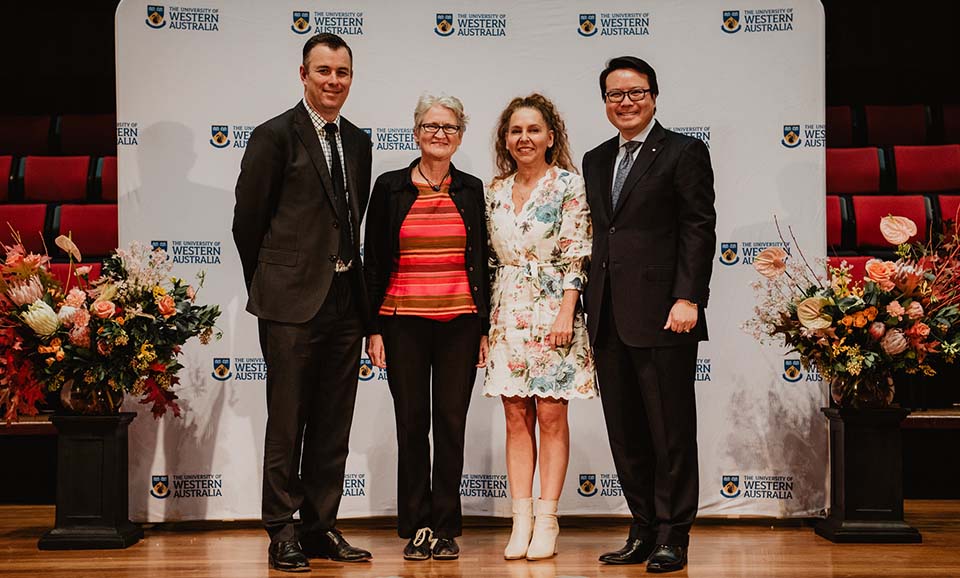
Dean and Head of School Professor Natalie Skead and Dr Andrew Lu OAM
2018 Awards Ceremony
The Law School’s Awards Ceremony was held on 29 May in the magnificent Winthrop Hall. This highlight of the School’s calendar celebrated the achievements of students and staff in the 2018 academic year and recognised the 2019 bursary and scholarship recipients and the generosity of our donors. UWA Law School alumnus Dr Andrew Lu OAM, partner at HBA Legal, gave a brilliant, deeply personal and compelling address on diversity and well-being in law. Associate Professor Stella Tarrant, UWA Law School, inspired all present with her reflections on law, justice, fairness, kindness and love. Photos of the night are available for viewing and download.
Notable award recipients were:
- Rachel Eaton – Herbert Smith Freehills award for the Juris Doctor Graduate with the highest weighted average mark
- Stephen Puttick (in absentia) – King and Wood Mallesons Prize in Law for the Juris Doctor student who achieved the highest mark in Advanced Legal Research by Invitation
- Dean’s List recipients – the Dean's List recognises our outstanding JD graduates. The 2018 recipients are listed on the Law School website.
For information on how to support a student through prizes or scholarships, contact [email protected]
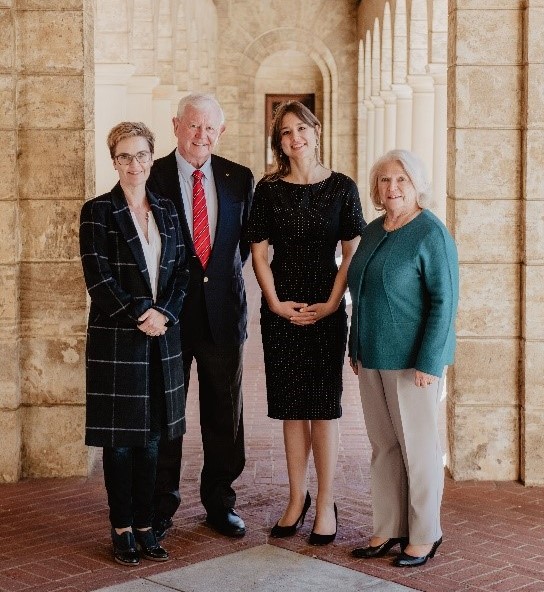
2019 Ciara Glennon Memorial Scholarship
Third-year Law student with a passion for helping others Tayu Wilker has been awarded this year’s Ciara Glennon Memorial Law Scholarship
Tayu completed a Bachelor of Commerce at UWA in 2012 and is now undertaking the Juris Doctor. She has also worked as a paralegal at Jackson McDonald in the legal technology support team, and as a volunteer for several organisations, including the Blackstone Society, Piddington Society, Oak Tree Foundation and WA Department of Communities.
As part of the scholarship, Tayu will undertake a paid internship with Ashurst.
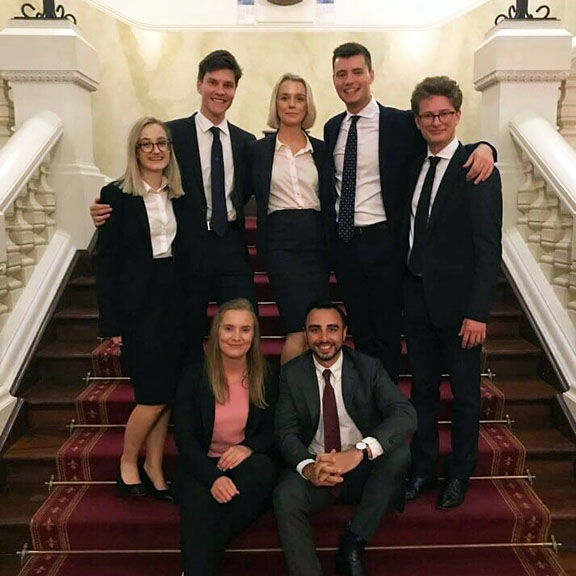
and their coaches Charmaine Roughley and Matheo Vinciullo [seated] and Andrew Hanna [absent]
Jessup Moot
The 2019 Jessup Moot team performed exceptionally well in the National Championship held in Canberra in February. After a challenging competition, the team made it into the quarter-finals where unfortunately they were defeated by Sydney Law School.
Congratulations to the team Olivia Everett, Katherine Swann, Bremer Moore, Harry Sanderson and Jesse Martino and their coaches Charmaine Roughley and Matheo Vinciullo and Andrew Hanna [absent] on an outstanding Jessup campaign and a huge thank you to everyone who gave their time to judge practice moots. Congratulations also to Olivia and Katherine who were named the 4th and 8th best oralists respectively in the preliminary rounds.
If you'd like to support the Jessup Moot team, please contact the Law School at [email protected].
Student Internships
The legal internship unit provides students with a wonderful opportunity to experience a practical legal placement with a law firm, barrister, CLC, government department, court, tribunal or other legal host organisation. 2018 internship student Matthew Price said he "relished the chance to help people by applying my Law School knowledge to real world situations".
The internship runs for one day per week for 12 weeks over second semester. Feedback about the internship from both students and hosts is overwhelmingly positive. This may explain why we have received a record number of 90 applications for the 2019 internship.
If you're interested in enquiring about the UWA Law School Legal Internship program, please contact Penny Carruthers: [email protected].
Staff news
Teaching excellence
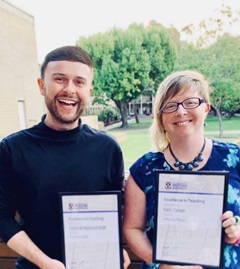
The Teaching Excellence Awards recognise the quality and dedication of teaching staff in the Law School and encourage quality and innovative teaching practices. The Law School congratulates two Law School recipients of Faculty of Arts, Business, Education and Law Teaching Awards in April:
- Dr Melanie O’Brien: Excellence in Teaching in the category of Early Career
Mr Aidan Ricciardo: Excellence in Teaching in the category of Tutors & Sessional Staff
The hard work and passion of both recipients was recognised by the Pro Vice-Chancellor (Education) in a presentation at the Law Awards Ceremony on 29 May.
Research excellence
Australian Research Council's Excellence in Research
The latest Australian Research Council’s Excellence in Research for Australia (ERA) 2018 results ranked the Law School's academic research as above world standard. Alongside ERA, the Engagement and Impact Assessment results showed our performance in translating research into meaningful benefits for the community was also strong.
In addition, the significant social impact of research on climate change and displaced communities led by Associate Professor David Hodgkinson was recognised with the highest possible ranking in the Research Impact assessment.
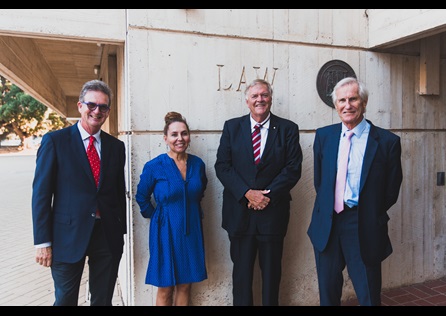
Petroleum Resource Management Seminar and Book Launch
The Centre for Mining, Energy and Natural Resources Law (CMENRL) launched the Centre’s Co-Director Professor John Chandler’s book, Petroleum Resource Management: How Governments Manage Their Offshore Petroleum Resources on Wednesday 13 March at the Law School. The book was launched by The Honourable Kim Beazley AC, Governor of Western Australia, followed by a panel discussion chaired by Professor Richard Bartlett with panel members Professor Erika Techera and Mr Gavin Ryan, General Counsel of PTTEP Australasia. The launch, followed by drinks and conversations in the Law School courtyard, was very well attended and a great success.
[Photo L to R: Professor John Chandler, Dean and Head of School Professor Natalie Skead, The Honourable Kim Beasley AC, Professor Richard Bartlett]
Law changes urged in property issues involving family violence
We need government support to improve legal aid services to help people resolve property matters where family violence is involved, according to research led by UWA's Associate Professor Jill Howieson, Professor Robyn Carroll, Associate Professor Sarah Murray and Dr Ian Murray. The research project was a collaboration with researchers from Murdoch University, the University of Notre Dame and Law Access.
Lead author Associate Professor Jill Howieson said family and domestic violence was one of the biggest social and legal issues facing Western Australia, with WA reporting the highest proportion of assaults related to family violence in Australia.
Staff member wins literary award
Law School academic and award-winning writer and illustrator, Dr Ambelin Kwaymullina and co-author Ezekiel Kwaymullina recently received the Victorian Premier’s Literary Award for Writing for Young Adults for their book Catching Teller Crow. The book has also been shortlisted for the Indie Awards and the Aurealis Awards, long-listed for the Australian Book Industry Awards, and named a Notable Book 2019 in the Children’s Book Council of Australia Book of the Year awards.
Disability Discrimination Commissioner appointed
The Law School congratulates Dr Ben Gauntlett, Senior Lecturer at the UWA Law School, on his appointment as Australia’s Disability Discrimination Commissioner at the Australian Human Rights Commission and wishes him every success in his new role.
New staff
This semester we welcomed to our teaching staff alumni and former Law School sessional teachers, Dr Natalie Brown and Aidan Ricciardo.
We also welcomed Dr Matthew Ruggiero and Dr Darren Moroney, who joined the UWA Mediation Clinic as Research Project Officers.
Academic promotions
The Law School congratulates Dr Fiona McGaughey, Dr Renee Barker and Dr Juan He on their well-deserved appointments to Senior Lecturer.
New adjuncts
The UWA Law School welcomes the following new Adjunct Professors:
- The Honourable Wayne Martin AC, former Chief Justice of the Supreme Court of Western Australia.
- The Honourable Stephen Thackray, former Chief Judge of the Family Court of Western Australia.
- Mr Anthony Willinge, Francis Burt Chambers, Honorary Consul to the Netherlands.
Law School spotlight
- Dr Julia Powles
-

Tell us about your teaching in the Law School.
I am really excited to be designing new units and courses around technology law and governance, to really set our graduates apart, to offer region-leading postgraduate offerings, and to provide cutting-edge professional education opportunities.
What are your areas of research interest?
I work on privacy, intellectual property, internet governance, and the law and politics of data, automation, and artificial intelligence. I spend a lot of time researching the big household names in technology – Google, Facebook, Amazon, Microsoft, Apple … and, increasingly, Baidu, Tencent, Alibaba – and the ways that they innovate with, and around, law, policy and governance. I’ve just finalised a big study (with Ellen P. Goodman) on how Google-affiliate Sidewalk Labs is envisioning the future of cities and urban life, through a test-bed project on the largest stretch of underdeveloped land in North America, the Toronto waterfront. It complements another project I did (with Hal Hodson) on Google-affiliate DeepMind and its work with the British National Health Service; its first international play into healthcare services. Both moves are deeply consequential and problematic on multiple fronts, but the degree of rigorous, independent scrutiny and analysis is remarkably slim. This is due in part to the special aura of tech companies, but it also speaks volumes about our fascinating, complicated complicity in their rise, as well as in the privatised, limited, often disempowering rhetoric around innovation. I challenge any sense of inevitability about the future of technology: I think it’s ours for the making.
What path have you followed since leaving law school?
I have always loved working at the intersection of law and science. As a fresh graduate, I worked for a couple of years in Sydney, first as a judge’s associate in the Federal Court and Administrative Appeals Tribunal, and then as a junior IP/IT lawyer at MinterEllison and part-time lecturer at UNSW. From Sydney, I had the good fortune to obtain a Commonwealth Scholarship to Oxford, where I juggled rowing, studying, and attending guest lectures across every aspect of science, art, law, and politics. At Oxford, I applied on a whim for a job advertised in The Economist, and found myself working in Geneva as the Speechwriter for the Director General of the World Intellectual Property Organization. Skiing, writing, travelling, and marathoning then gave way to a PhD at Cambridge, where I specialised in patent law, enabling me to spend some time in Munich, at the Max Planck Institute and the European Patent Office. During my PhD, I also started writing for Wired, The Guardian, Slate, and other publications, continuing the breadth of interests that had animated me throughout work and study, and writing for a broad audience. Post-PhD, I was fortunate to become a fellow cross-appointed between law and computer science at St John’s College, Cambridge, to work as a contributing editor and policy fellow for The Guardian, to do a range of tech policy-related projects in London, Brussels, and Berlin, and then to spend a couple of magical years in New York, in academic positions at Cornell Tech, NYC’s bold new tech campus, and at New York University, where I worked in the Law School’s Information Law Institute.
What are your aspirations for the Law School?
Quite genuinely, I can think of no more exciting place to be, for the work I want to do, the people I hope to work with, and the opportunities and challenges that I think we must seize around technology and governance. The world is thirsty for new ideas, for big ideas. Western Australia has a distinct opportunity to be a leader in stimulating and governing technology in the public interest. From the creation of a future-oriented State privacy law to reforms around community-driven innovation and protection of our biodiversity to international leadership on the societal impacts of artificial intelligence and automation, we can set world-class examples for civic and rights-based governance frameworks for technology.
- David Hodgkinson
-
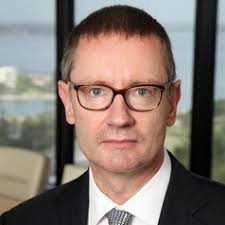
What do you teach at the Law School?
I teach aviation law and climate change law, both intensive courses. I also teach company and commercial law in second semester, and have taught in Foundations of Law.
What are your areas of research interest?
Happily, my areas of research interest are to some extent also those in which I teach.
In terms of aviation law, research includes the development of a general framework within which the operation of drones (or UAVs) can be regulated. There has been no significant, coordinated response by states to address drone operations.
In terms of climate change law, I have developed guiding principles on climate displacement within states. The principles have been recognized by the Australian Research Council and have been implemented in a number of countries.
These research interests have led to the publication of books on drones and international air carrier liability.
What path have you followed since leaving law school?
I joined Herbert Smith Freehills as an articled clerk, and then spent a year at the High Court of Australia where I worked mostly for Justice Sir William Deane. I subsequently worked in various offices of Freehills and developed some expertise in aviation law. That led to a job with the International Air Transport Association (IATA) – the organisation of the world’s airlines – in Montreal and Geneva as Director of Legal.
Post-IATA I worked with law firm Clayton Utz and as a principal in my own aviation law firm. I also joined the Law School faculty.
What are your aspirations for the Law School?
I have recently been appointed as a co-director (with Professor John Chandler) of the Centre for Energy, Minerals and Natural Resources Law.
John and I have an ambitious agenda for the Centre that includes close collaboration with industry, an extensive publishing schedule, seminars, short courses and round-table discussions. - Justice Nyema Nwabueze
-
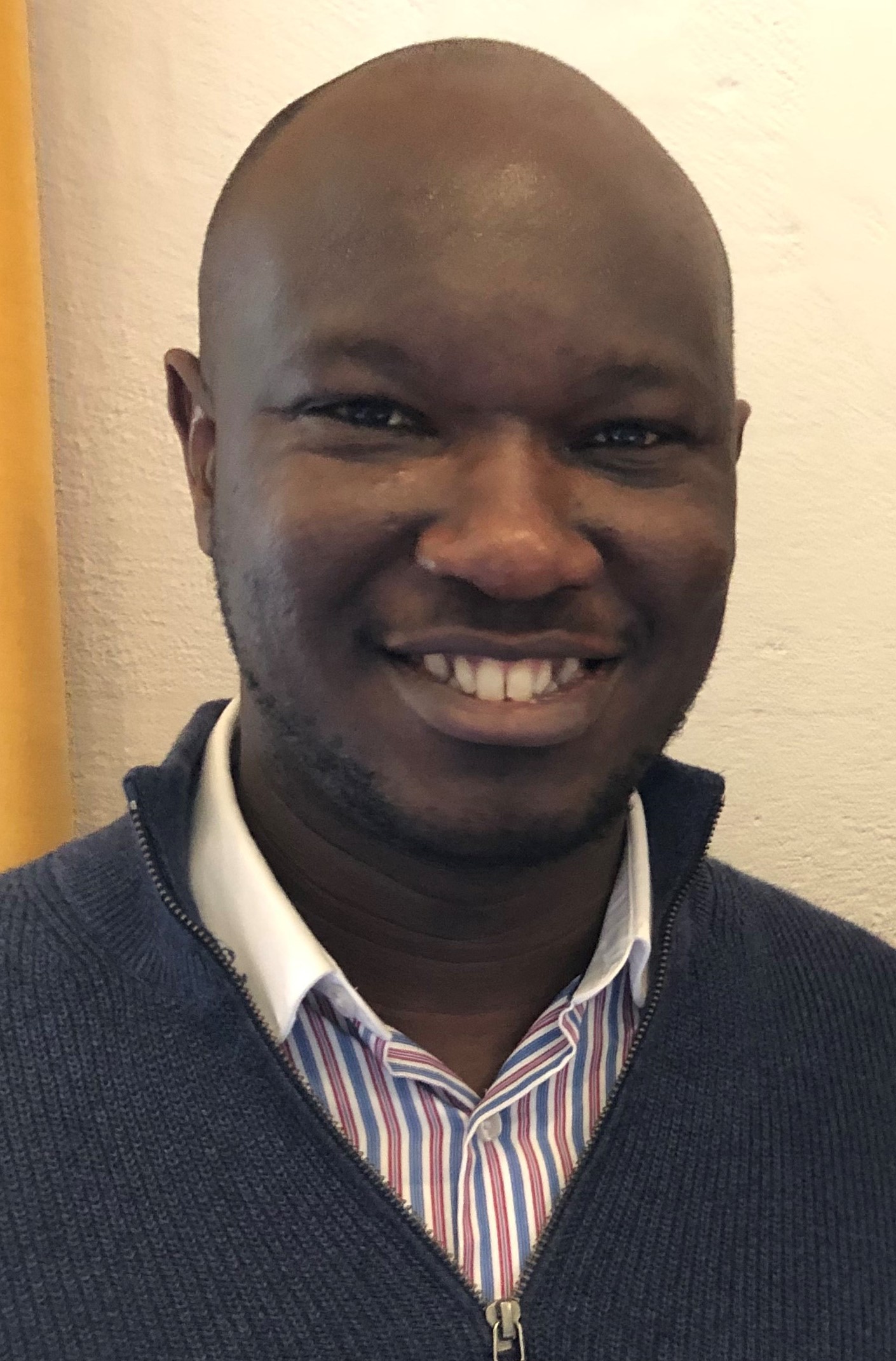
You have recently commenced your PhD at UWA. How would you describe the research you are undertaking?
My research investigates how the international environmental law principle of Common but Differentiated Responsibility (CBDR) could inform trade determinations of disputes relating to renewable energy development in developing countries. The fragmentation of international law means that various branches of international law are regulated by different legal regimes that sometimes operate in isolation from other branches of international law or from the broader framework of international law. This kind of system has the potential to create tension in the application of law, especially when the expressed purposes of the various legal regimes conflict one with another. This tension is compounded when renewable energy related disputes are in issue, because energy issues, by their nature are politically charged since they have strong impact on economic growth and development. So it is basically a research that explores the potentials for regime interaction of the principle of international environmental law stated above and the legal rules of the World Trade Organisation (WTO) in a development context. The practical significance of this research is that the evolution of legal regime in relation to renewable energy development, resulting from a bifurcated system (Trade and Environment) will have significant impact in the climate change discourse as renewable energy is universally projected as the main instrument in the fight against climate change and decisions emanating from the WTO have strong impact on energy policies and governance.
What do you most enjoy about doing a PhD at UWA?
Whilst it is clear that the teaching and research activities in UWA are of world standard, when you come in here, you will still have the laid-back feel that Australia is known for. The professors, even the big names, grant you access when you need them. Also the Law School is blessed to have a group of PhD researchers that love and care for each other. Most days, we have lunch together and organise regular outings which provide a break from research. It is this collegiality that makes UWA Law School the best place to pursue graduate research!
What advice would you offer to prospective PhD students?
My advice to prospective PhD students would be: think carefully about the area of law that you are most interested in and which you enjoy. Even though there is a lot of support and collegiality, it is still a long journey of about 3 to 4 years and you will, most likely, be the only person working on that research. Here at UWA, we talk to each other about our research and those informal discussions are mutually beneficial in terms of the standard required, issues of methodology, and general research questions. In the end, however, you are responsible for your research! You should do some preliminary research on your chosen area of law, having at least an idea of the kind of contributions you wish to make to legal development. This kind of preliminary research will shine through your research proposal and make life easy for you from the beginning.
Alumni news
- Professional award recipients
-
- Dr Madeline Hartley won the Excellence Award at the Corporate Counsel Awards.
- Dr Andrew Lu OAM was named the Asian Australian Lawyers Association Diversity Leader for 2019.
- Heidi Gan was named the Asian Australian Lawyers Association Young Lawyer of the Year from 2019.
- Kelsi Forrest was named the Law Society of WA Lawyer of the Year.
- Embarking on postgraduate studies
-
- Francis Cardell-Oliver is headed to Cambridge University to study a Master’s and is the recipient of a Choral Scholarship from Gonville & Caius College.
- Gary Cheung will study a Master's at Cambridge University and is the recipient of the Cambridge Australia Frank Downing Scholarship.
- Charles Dallimore will undertake the BCL at Oxford University.
- Guru Kugananthan is undertaking a Master of Laws at the London School of Economics.
- Holly Ransom is the recipient of a Fulbright Scholarship to study a Master's of Laws at Harvard University in Public Policy.
- Benjamin Tomasi will undertake the BCL at Oxford University.
- Class of 1993 Reunion
-
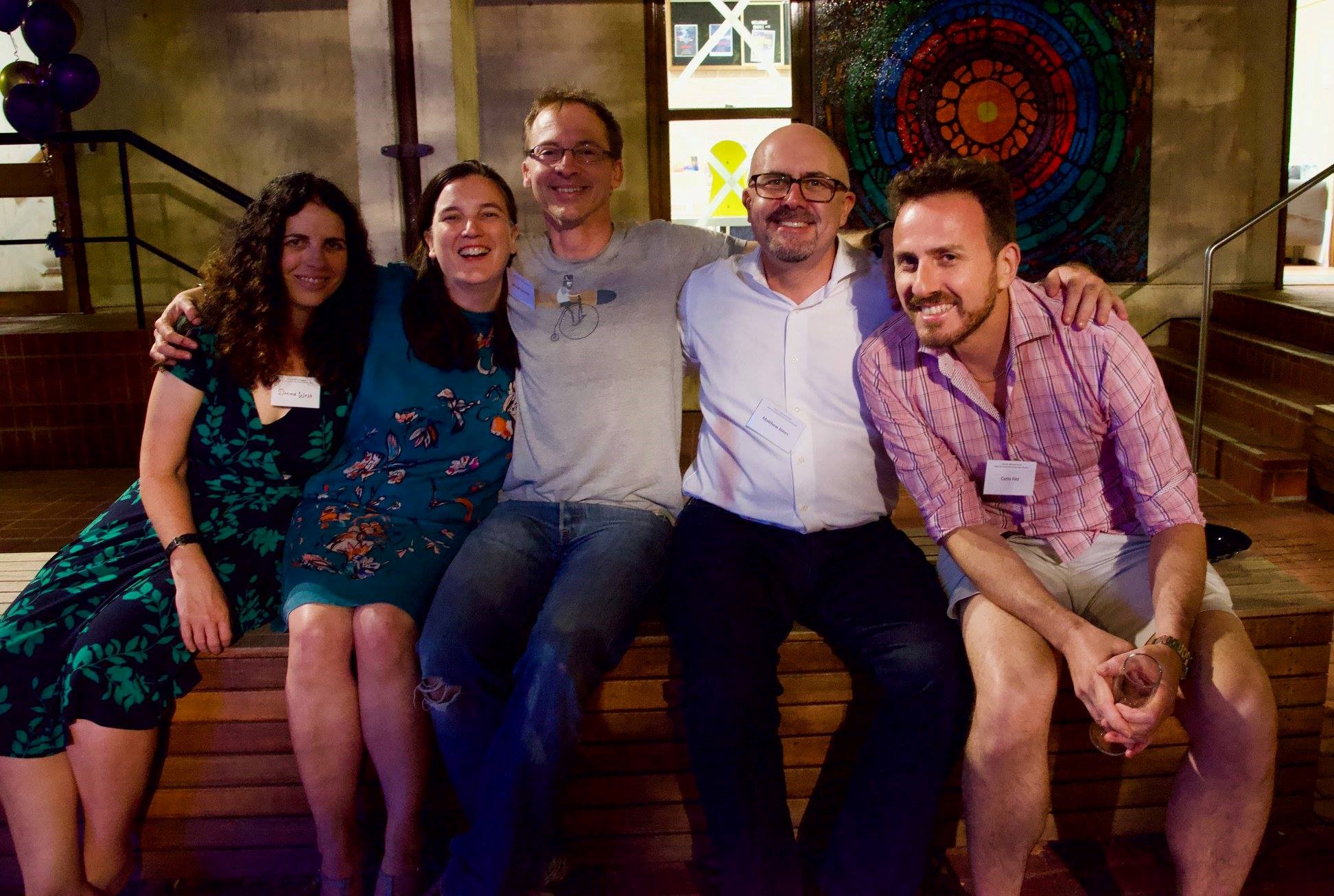
There was a terrific turnout for the reunion held in the UWA Law Courtyard in February. Around 100 members of the class of '93 and others of that era, including a few staff, caught up with each other and enjoyed a night with rousing speeches and a band that included some former classmates. Reunion organiser Michael Lundberg reflects on the night:
“The first reunion of the Law School Class of 1993, after 25 years, was always going to be special, but getting permission to hold it in the Law School courtyard, and bringing everyone back to UWA, made the night simply fantastic. A great evening catching up with old friends and teaching staff.”
Classmates pictured here are (from L to R) Donna West, Dominique Hansen, Michael Bennett, Matthew Jones, and Carlo Fini.
Contact the Law School at [email protected] if you are interested in organising a class reunion.

